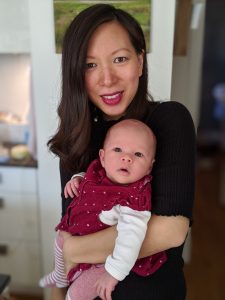Kingyi Fuchs was elected to the Management Board of Dr. Klein Privatkunden AG at the age of 31. She has a 16-month-old daughter and remains a member of the board. Fondsfrau Anke Dembowski talks to her about how she thinks about her career and how she manages to juggle her job and family.
Ms. Fuchs, you joined the Management Board of Dr. Klein Privatkunden AG in March 2018. What areas are you responsible for there?
Dr. Klein is a financial services provider with around 650 advisors across Germany, most of them self-employed. We help female consumers find the right financing and protection. I am responsible for digital customer access and marketing.
You are young, for one thing, and a woman, for another. Did you feel any resistance when you were being discussed as a member of the Board of Management at the age of just 31? How did you respond to this resistance?
At least I didn't experience any direct resistance. But I can imagine that people had doubts about whether I had enough experience. Subliminally, I also felt reservations because of my age. But I don't react very emotionally to that. Rather, I think: Is it worth it to me to energize this topic? Should I start the conversation? If it's people I value, then I follow up. I then ask, for example, about the expectations my counterpart has, or about his or her definition of success. If I know this, I can respond to it and use my qualities constructively.
The financial industry doesn't have the greatest reputation among young women. What is your view of the industry?
The bottom line is that it is still male-dominated and when many think of "finance" they think of people whose focus is to sell something. Sure, sales is part of the business and in some companies there are a lot of stipulations and pressure to sell certain products. But there are also exceptions, and it's not for nothing that I've been with the Hypoport Group for over ten years, where people play a big role and there's a great deal of freedom to shape and develop. In addition, financial service providers also have many job profiles where the industry doesn't play a role, such as in marketing, accounting, business development or software development. Here, at the latest, the teams are diverse and the people have very different backgrounds. I myself don't come from the banking or insurance world either. The question is: Where and how can I apply my skills and knowledge?
What do you enjoy most about your job?
When I started at Dr. Klein, I saw: There are not only people who want to sell something and there were many exciting topics for me. I incredibly enjoy working with people, also in different teams. I like to listen to what they have to say and I'm good at structuring what I hear. My passion is to develop new topics where there are opportunities and to set the course for this. I also like to solve problems. I have a seventh sense, so to speak, for knots in structures and stagnant processes. And solving them together with my teams or getting them flowing again - that's really great fun.
The company you work for is one of the FinTech companies that stand for a breath of fresh air. Do you think that FinTechs are already further along in terms of diversity than the established financial sector?
Such sweeping judgments are always difficult, but in general I would say: Yes! Although there are already many new approaches, classically organized companies often still live the old image: hierarchies, clinging to power, and networks that only stew in their own juices. As a result, they can no longer move forward at the same pace as the FinTechs. FinTechs have a completely different energy and their sleeves are rolled way up. To achieve their goals, they rely on diversity - both in terms of professional background and characters. We, for example, always look at what kind of personalities are needed and whether they fill in what is missing. FinTechs tend to be more open to talent from other areas and industries and develop their employees more themselves.
You have a double degree: OnlineMedien at Furtwangen University and Project Management and Information Technology at BFI Vienna. How important are degrees, and how important are technical degrees for a career in finance?
Right up front, when I get applications on the table, the educational qualification is the least interesting part! That's not the first thing I look at. More relevant than the degree is whether someone can credibly convey that they are capable of learning and developing. The most helpful thing I learned in my studies is: to find answers to new questions and to always ask new questions. I think this ability to learn new things is extremely important - and you don't necessarily need a degree to do that.
I would never ask men this question, but we women are simply interested in how others do it... You are also a mother. How do you reconcile your job and family?
(laughs) I get asked that more often! After all, family is something you want for yourself personally, and I want both: a job and a family. In fact, it's not easy to reconcile the two. It helps me to know why I'm doing this. From the very beginning, it was important to me that I could continue to develop in my job, even as a young mother. If I don't, I'm unhappy, and that affects the whole family. For this to happen, things have to be right with my partner. My partner understands my professional ambitions; job and family are important to him, too. We share the household and the child, and both of us are now working full time again. To make this work, we have a reliable childminder. She comes to our house, looks after our daughter and folds the laundry every now and then. It is always helpful if the parents or parents-in-law can be involved, but unfortunately our families live far away.
 What advice do you have for working women who want to have children? What is the best way to plan and communicate with your employer?
What advice do you have for working women who want to have children? What is the best way to plan and communicate with your employer?
If you're expecting a baby, you should communicate it early. I spoke to the Supervisory Board after the 12th or 13th week of pregnancy and then immediately to my two colleagues on the Board of Management. Everyone took it really well and supported me. Two weeks later, I then informed the teams and HR management.
How long should you stay out of the job?
I was completely out for four months. My husband and I agreed that after that we would always alternate taking two months of parental leave and the other would work full time. Since we could both work remotely, I could continue breastfeeding. The person on parental leave could decide for himself how much additional work he wanted to do - or not. Of course, this is also a money issue, and I can fortunately afford time off financially. It was more difficult with the responsibility as a board member. Fortunately, there's the Stay-on-Board Initiative: It has now obtained legal clarification that board members can take up to six months off and are released from liability during this time. At the time, I had agreed with the Supervisory Board that I would be released from work during my parental leave, and I clarified the liability issue with my colleagues on the Board of Management.
What is generally important to you in your job?
The activities that you do at work should not drain you in the long run. You should find as many things as possible at work that you enjoy, from which you can also draw energy. If something costs you energy over the long term, you should give it up. I often think about who in the company can help employees succeed at the important things. In my team, I have trust-based working hours. I don't care how long it takes someone to complete their tasks. The main thing is that I can rely on the work actually being done.
A question about career planning: It's often said that if you want to move up, you have to change companies more often. You've been with the Hypoport Group since 2010, so you haven't changed companies. What advice do you have for young women who want to move up? Change or stay?
The fact that you have to change companies more often in order to make a career is, I think, only the case in very hierarchically organized companies. I have actually only seen the Hypoport cosmos and can advise: If you notice that you are in the wrong company, you should change. It quickly becomes obvious: Are the right people being promoted? If not, you should open yourself up to a company that fits better. Hopefully, the right people will be promoted there. But of course you also have to make sure that you are visible in order to get ahead.
What career tips can you give women? In your view, what are the do's and don'ts for women in the finance industry who want to make a career for themselves?
The top priority is the question: What do I need to be happy? A career also means more responsibility and more room for maneuver. In this environment, it's important to be able to play with the creative leeway. As you climb the career ladder, fewer and fewer people tell you what to do: Leadership falls away the higher you go. That's why you have to take on this leadership yourself. To do that, it's important to know myself very well: What do I do well? Where are my weaknesses and where are my strengths? It helps to know which things trigger me and which drive me crazy.
And the interaction with the team?
For me, it's extremely important to hear what the team is thinking - and what's on the minds of the people behind the roles. To do this, I talk to the team a lot and also have the courage to address the elephant in the room. If something goes wrong, I want to steer it in a constructive direction. I'm good at acknowledging what others are doing. If there are things that need to be decided, I don't let up. I think if you do all that, people are grateful. I'm tough on the issues and soft at the core!
Thank you, Ms. Fuchs, for the great ideas and sharing!
 About Kingyi Fuchs:
About Kingyi Fuchs:
Kingyi Fuchs has held various positions in the Hypoport Group since 2010. These include managing the Hypoport subsidiary Vergleich.de as well as marketing management at Dr. Klein. Since March 2018, she has been on the Management Board of Dr. Klein Privatkunden AG, where she is responsible for client access, marketing and digitalization. Previously, she completed a double degree: OnlineMedien at Furtwangen University and Project Management and Information Technology at BFI Vienna. In the process, she earned both Bachelor of Arts in Business and Bachelor of Science, OnlineMedien degrees.



